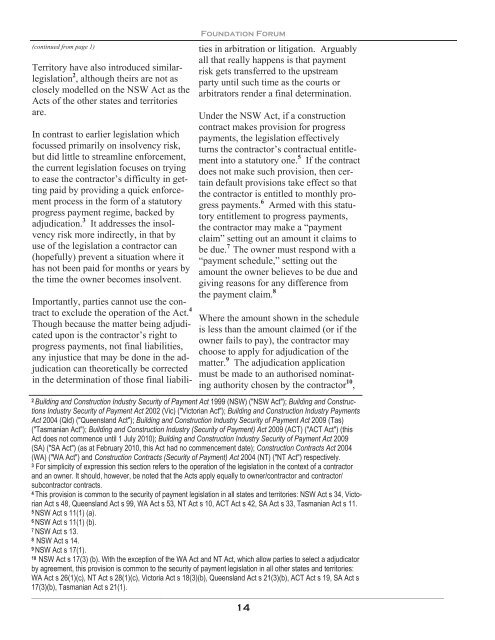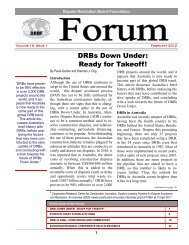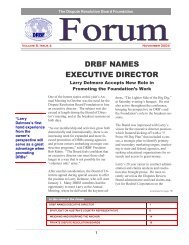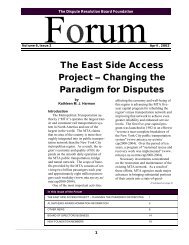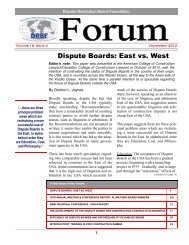Compatibility of Dispute Boards with Australia's Security of ...
Compatibility of Dispute Boards with Australia's Security of ...
Compatibility of Dispute Boards with Australia's Security of ...
Create successful ePaper yourself
Turn your PDF publications into a flip-book with our unique Google optimized e-Paper software.
(continued from page 1)<br />
Territory have also introduced similarlegislation<br />
2 , although theirs are not as<br />
closely modelled on the NSW Act as the<br />
Acts <strong>of</strong> the other states and territories<br />
are.<br />
In contrast to earlier legislation which<br />
focussed primarily on insolvency risk,<br />
but did little to streamline enforcement,<br />
the current legislation focuses on trying<br />
to ease the contractor’s difficulty in getting<br />
paid by providing a quick enforcement<br />
process in the form <strong>of</strong> a statutory<br />
progress payment regime, backed by<br />
adjudication. 3 It addresses the insolvency<br />
risk more indirectly, in that by<br />
use <strong>of</strong> the legislation a contractor can<br />
(hopefully) prevent a situation where it<br />
has not been paid for months or years by<br />
the time the owner becomes insolvent.<br />
Foundation Forum<br />
Importantly, parties cannot use the contract<br />
to exclude the operation <strong>of</strong> the Act. 4<br />
Though because the matter being adjudicated<br />
upon is the contractor’s right to<br />
progress payments, not final liabilities,<br />
any injustice that may be done in the adjudication<br />
can theoretically be corrected<br />
in the determination <strong>of</strong> those final liabilities<br />
in arbitration or litigation. Arguably<br />
all that really happens is that payment<br />
risk gets transferred to the upstream<br />
party until such time as the courts or<br />
arbitrators render a final determination.<br />
Under the NSW Act, if a construction<br />
contract makes provision for progress<br />
payments, the legislation effectively<br />
turns the contractor’s contractual entitlement<br />
into a statutory one. 5 If the contract<br />
does not make such provision, then certain<br />
default provisions take effect so that<br />
the contractor is entitled to monthly progress<br />
payments. 6 Armed <strong>with</strong> this statutory<br />
entitlement to progress payments,<br />
the contractor may make a “payment<br />
claim” setting out an amount it claims to<br />
be due. 7 The owner must respond <strong>with</strong> a<br />
“payment schedule,” setting out the<br />
amount the owner believes to be due and<br />
giving reasons for any difference from<br />
the payment claim. 8<br />
Where the amount shown in the schedule<br />
is less than the amount claimed (or if the<br />
owner fails to pay), the contractor may<br />
choose to apply for adjudication <strong>of</strong> the<br />
matter. 9 The adjudication application<br />
must be made to an authorised nominating<br />
authority chosen by the contractor 10 ,<br />
2 Building and Construction Industry <strong>Security</strong> <strong>of</strong> Payment Act 1999 (NSW) ("NSW Act"); Building and Constructions<br />
Industry <strong>Security</strong> <strong>of</strong> Payment Act 2002 (Vic) ("Victorian Act"); Building and Construction Industry Payments<br />
Act 2004 (Qld) ("Queensland Act"); Building and Construction Industry <strong>Security</strong> <strong>of</strong> Payment Act 2009 (Tas)<br />
("Tasmanian Act"); Building and Construction Industry (<strong>Security</strong> <strong>of</strong> Payment) Act 2009 (ACT) ("ACT Act") (this<br />
Act does not commence until 1 July 2010); Building and Construction Industry <strong>Security</strong> <strong>of</strong> Payment Act 2009<br />
(SA) ("SA Act") (as at February 2010, this Act had no commencement date); Construction Contracts Act 2004<br />
(WA) ("WA Act") and Construction Contracts (<strong>Security</strong> <strong>of</strong> Payment) Act 2004 (NT) ("NT Act") respectively.<br />
3 For simplicity <strong>of</strong> expression this section refers to the operation <strong>of</strong> the legislation in the context <strong>of</strong> a contractor<br />
and an owner. It should, however, be noted that the Acts apply equally to owner/contractor and contractor/<br />
subcontractor contracts.<br />
4 This provision is common to the security <strong>of</strong> payment legislation in all states and territories: NSW Act s 34, Victorian<br />
Act s 48, Queensland Act s 99, WA Act s 53, NT Act s 10, ACT Act s 42, SA Act s 33, Tasmanian Act s 11.<br />
5 NSW Act s 11(1) (a).<br />
6 NSW Act s 11(1) (b).<br />
7 NSW Act s 13.<br />
8 NSW Act s 14.<br />
9 NSW Act s 17(1).<br />
10 NSW Act s 17(3) (b). With the exception <strong>of</strong> the WA Act and NT Act, which allow parties to select a adjudicator<br />
by agreement, this provision is common to the security <strong>of</strong> payment legislation in all other states and territories:<br />
WA Act s 26(1)(c), NT Act s 28(1)(c), Victoria Act s 18(3)(b), Queensland Act s 21(3)(b), ACT Act s 19, SA Act s<br />
17(3)(b), Tasmanian Act s 21(1).<br />
———————————————————————————————————————————————————<br />
14


